Jenin refugee camp, Palestine 16 September 2004
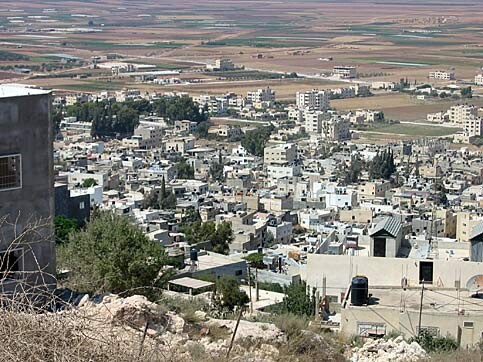
Jenin Refugee Camp. (Rima Merriman)
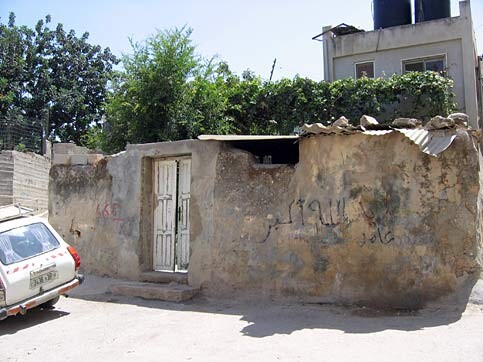
The Zeidans current dwelling in Jenin refugee camp to which they moved after the destruction of their home by Israeli forces on April 12, 2002. (Rima Merriman)
12 September 2004 — Ahmad Zeidan was only fifteen when his brother Mohammad (20) was arrested and imprisoned by Israeli forces in April of 2002.
In his pocket, he keeps two passport-sized photos, one of his brother Mohammad and one of his cousin. Nicknamed Abu al-Baha’, Ahmad’s cousin (pictured right in one of Palestine’s ubiquitous martyr posters) was shot dead at the age of 22 in May this year in one of the frequent Israeli invasions of Jenin refugee camp that Israeli forces make to assassinate Palestinians accused of “terrorism” against Israel.
In his billfold, Ahmad also keeps a letter written to the family by his brother from prison letting them know what had happened to him.
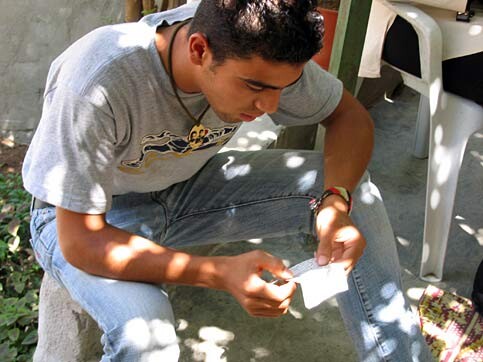
Ahmad Zeidan re-reading the letter Mohammad wrote to his family from prison. (Rima Merriman)
It is penned carefully on a fragile silver-backed paper wrapper:
In the Name of God the Merciful “Do not be sad or fear if you are believers for then you are favored.”
My precious mother, my dear father, my brothers and sisters who are dear to my heart, I say to you, be patient. I say it while I am missing you very, very much. Mother, do not cry for me. I had wished for martyrdom, but God has instead allowed me this imprisonment. I want you to know the good news that the captain who arrested me is now dead, and so is the soldier who beat, blindfolded and handcuffed me and threw me to the ground. I was kept for one night in the house near the hospital, then they took me to al Sa’adeh grove, and there horrors happened. They beat us while we were handcuffed, but God was with us and helped us endure. Listen, they took away the boots you bought for me from al Rabesh, and I am barefoot. Mother, we have everything we need, thanks be to God, and I beg you to give my regards to my brothers and sisters Ahmad and Shuja’ and Sharaf and Rasha and Hana’ and Raja and Salaam and Dalal and also to my cousins Ata and Hussein and Samir and all of them. Please send me some clothes through the Red Cross, because the soldiers stripped me of my clothes and now I am wearing what I borrowed from other men. I ask you to go to the Red Crescent and request that they trace my whereabouts through the Red Cross. Peace and the mercy of God be on you. At any rate, thank God that you are all unharmed.
Your faithful and loving son, Mohammad
P.S. Right now I am imprisoned in al Jalmeh (Haifa). I don’t know about my court date or when they will be taking me.
Among the charges (ten of them whittled down to seven) against Mohammad are that he is a member of Kataeb Shuhada al-Aqsa (“The Al-Aqsa Martyrs’ Brigade”), that he has thrown stones at Israeli soldiers during demonstartions, that he has thrown an explosive at a bulldozer, that he harbors other terrorists in his home. His parents believe that this last charge refers to his friends visiting him at home in the evenings. The document they have is in Hebrew, which they can’t understand. They believe that one charge is that he had ‘shot at a bird’.
Mohammad was arrested on April 24, 2002 while undertaking rescue operations as a Jenin EMS volunteer with the Palestine Red Crescent Society. This was during the Israeli March 29- May 10, 2002 invasions. He was in an ambulance when he saw flames coming up from the vicinity of his home. He headed that way to check on his family’s safety. He was stopped and arrested in front of Abu al Abed shop. The soldiers who arrested him told him cruelly that his family was under the rubble of his bulldozed home. “All, all was inside,” they told him in broken Arabic.
At the time 56 people were hiding on top of one another in the small house. In addition to his immediate family, there were his three uncles and their families. They waited until the bulldozer crushed the third column of the balcony when the building began to topple and the fire started before rushing out “like ants.” The women rushed out screaming and holding on to the children and some of the men hit back with whatever they had at the bulldozer and the tanks behind it.
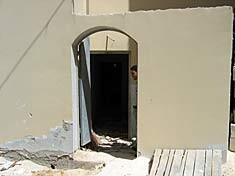
The entrance to the Zeidan familys new home, which is being rebuilt through the generosity of Sheikh Zaid bin Sultan and the people of the United Arab Emirates after Israeli forces bulldozed and set fire to the home on April 12, 2002 along with most of Jenin refugee camp. (Rima Merriman)
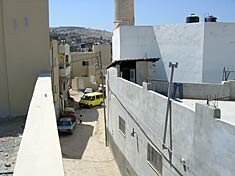
Hundreds of people lost their lives as well as their homes as a result of the Israeli invasions. Here, a rebuilt alley in Jenin refugee camp where the Israeli bulldozers and tanks entered, the newer concrete on the right side of the street is visible. (Rima Merriman)
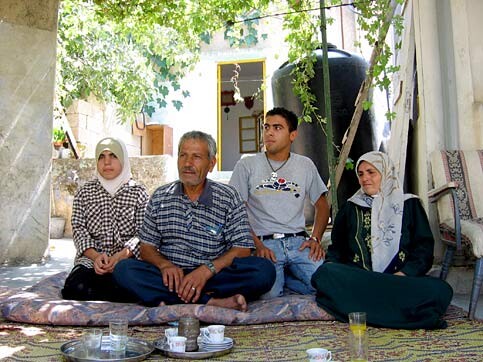
Mohammads parents, his brother Ahmad and his sister Rasha in the courtyard of their present home. (Rima Merriman)
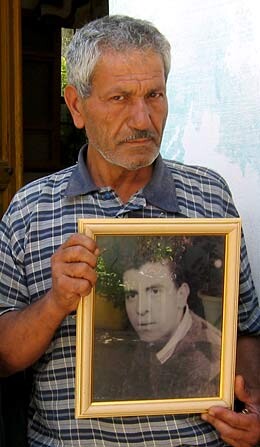
Hussnee Zeidan holding his imprisoned sons photo. (Rima Merriman)
After the bulldozing of his home in the camp, he moved with his family to the city, but is now back in the camp awaiting the completion of the construction of his destroyed home through the generous help of Sheikh Zaid bin Sultan and the people of the United Arab Emirates.
A year and a half after his arrest, Mohammad had his hearing and was sentenced to seven years. He is now in al Naqqab prison. His family has so far been able to get permission to visit him after three applications.
Rima Merriman is a freelance writer and a communications specialist. She has been working in the West Bank for the past four months.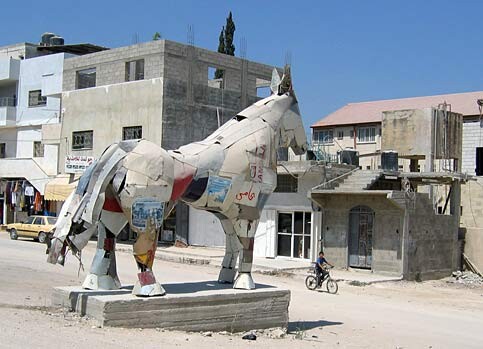
Thomas Killpers horse sculpture in Jenin refugee camp. Built with the help of a group of Palestinians in Khan Yunis and carted all the way to Jenin, the horse is made up of scrap metal from destroyed houses and cars including part of the shelled ambulance in which Dr. Khalil Suleiman, director of emergency services for the Red Crescent in Jenin, was killed on March 4, 2002. (Rima Merriman)





